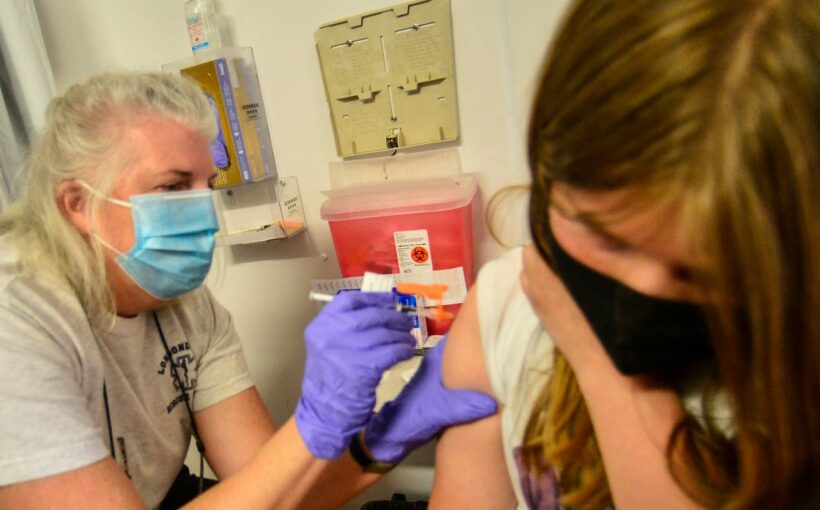As the United Kingdom reopens its economy, including lifting restrictions on travel and hospitality, experts are warning of a surging variant even as inoculations remain relatively high.
The variant, first discovered in India and surging there in the past few months, is present in at least 49 countries, including the U.K. Scientists, who are sequencing half of coronavirus cases, say it is “highly likely” to be more transmissible than Britain’s variant.
But inoculations in the country remain some of the highest in the world, due to a nationalized vaccine campaign. 70% of adults in the country have had a first vaccine dose, according to BBC. But the variant still has had “rapid growth” in some local areas, according to experts.
“If vaccination reduces the likelihood of transmission for this variant, increasing regional vaccination in areas where it is prevalent could dampen growth in infections, although it takes several weeks for vaccines to provide protection,” the study says.
British health officials said Sunday that the Pfizer and AstraZeneca vaccines offer effective protection against the India variant.
Meanwhile, in the U.S., more than half of adults are now fully vaccinated against COVID-19 in 25 states, the District of Columbia and Guam, according to Centers for Disease Control and Prevention data.
Also in the news:
►Ahead of the Tokyo Olympics this summer, the U.S. State Department raised Japan to “Level 4 – do not travel” on Monday due to COVID-19, and the CDC indicated a “very high” level of coronavirus and recommended not traveling to the country.
►Puerto Rico has ended a nightly pandemic curfew after more than a year in force and will allow vaccinated visitors to enter the island without a negative coronavirus test result.
►Florida is joining a growing list of Republican-led states that plan to end participation in a federal program that gave an extra $300 per week in benefits to the unemployed during the pandemic.
►New York Mayor Bill de Blasio said all the city’s public schools will be back full time, in-person in September. No remote option will be offered, the mayor said in an interview on MSNBC. Los Angeles Unified School District, in contrast, will start the new school year next fall with on-campus, in-person instruction but will retain an online option, Superintendent Austin Beutner said Monday.
► Uber and Lyft have started providing free transportation to and from COVID-19 vaccination sites in the United States.
📈 Today’s numbers: The U.S. has more than 33.1 million confirmed coronavirus cases and 590,500 deaths, according to Johns Hopkins University data. The global totals: More than 167.1 million cases and 3.46 million deaths. More than 357.25 million vaccine doses have been distributed in the U.S. and more than 286.8 million administered, according to the CDC. More than 130.6 million Americans have been fully vaccinated – 39.3% of the population.
📘 What we’re reading: People with compromised immune systems face potential threat from people not vaccinated for COVID-19. Read more here.
Keep refreshing this page for the latest updates. Want more? Sign up for our Coronavirus Watch newsletter for updates to your inbox and join our Facebook group.
California forecast to see fewer births in 2021, report says
In combination with the COVID-19 pandemic, affordable IUDs, and increasing costs of living, more California adults are opting for contraceptives over the start of a new family. As a result, California is expected to see 50,000 fewer births in 2021, according to the Los Angeles Times.
At the beginning of the pandemic, 40% of women reported changing their plans about having children — either when or how many to have — because of the pandemic, according to the Guttmacher Institute. Meanwhile, one-third of women reported wanting to delay pregnancy or have fewer children.
Between unemployment, the cost and availability of childcare, and rising costs of rent, more women decided to not get pregnant and hold off on family planning, Ponta Abadi, a reproductive health expert, told the Times.
“The pandemic freaked people out,” said Abadi. “It caused a lot of people to lose their jobs and affected whether they wanted to have kids.”
In addition, IUDs, also known as intrauterine devices, continue to grow as a popular form of contraception, especially after the Affordable Care Act made the option free for most patients. The long-last contraceptive that prevents pregnancy for up to 12 years attracted women because it was a one-time procedure that is more accessible than some birth controls that are restricted by politics and some insurances.
In the time of the pandemic, IUDs have helped women plan for parenthood later in life.
3 Wuhan researchers ill before first cases revealed in 2019
China on Monday denied a report that three Wuhan Institute of Virology employees were hospitalized with possible coronavirus symptoms in November 2019, a claim that if true would further fuel debate over the origins of the pandemic.
The Wall Street Journal cited a U.S. intelligence report saying the previously undisclosed information provides fresh details on the timing of the hospital visits about a month before China reported the first infections. China and the World Health Organization have downplayed calls for a broader investigation into whether the virus could have escaped from the laboratory.
White House Press Secretary Jen Psaki, asked about the controversy Monday, said the administration has been pressing for an international investigation led by the WHO.
“We need that data. We need that information from the Chinese government,” she said. “What we can’t do, and what I would caution anyone doing, is leaping ahead of an actual international process.”
Yuan Zhiming, director of the lab, told the Global Times that the Journal report was “groundless.” China’s foreign ministry spokesman, Zhao Lijian, also called the claim “completely untrue.”
“The U.S. continues to hype the lab leak theory. Is the real intention to express concern over the virus origin or to divert attention?” Zhao asked.
Source: Read Full Article
